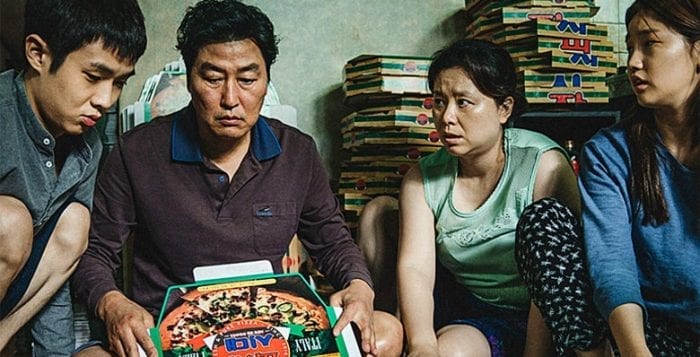Movie review: ‘Parasite’ – A darkly comic thriller

By Jeffrey Sanzel
Parasite is a portrait of the unexpected. In both the film and its worldwide reception, it is an undefinable work that both crosses and defies genre. It is also extraordinary cinema. Like JoJo Rabbit, it defies expectation and Parasite joins this film as one of the two best of the year. This South Korean hit lingers long after the fadeout.
The story seems deceptively simple. The Kim family lives in a squalid basement apartment, barely scraping by on menial jobs. Even in this they don’t succeed: witness an excruciating scene when they are called to task for their inability to properly fold pizza boxes. It is clear that they have gone from job-to-job with little success and diminishing prospects. Cramped into narrow, filthy rooms, they literally crawl the walls like insects, trying to steal a Wi-Fi signal.
 The son (affable Choi Woo Shik) is given the opportunity to tutor an affluent high school student (innocent Jung Ji-so). His sister (wily Park So-dam) forges his degree. When he enters the Park home, his wide-eyed awe is palpable. The house was constructed by a renowned architect and is more museum than home. Bright, modern and spacious, it whispers untold wealth — a stark contrast with the infested living conditions faced by the Kims.
The son (affable Choi Woo Shik) is given the opportunity to tutor an affluent high school student (innocent Jung Ji-so). His sister (wily Park So-dam) forges his degree. When he enters the Park home, his wide-eyed awe is palpable. The house was constructed by a renowned architect and is more museum than home. Bright, modern and spacious, it whispers untold wealth — a stark contrast with the infested living conditions faced by the Kims.
In taking in this wholly foreign world, it dawns on the son that this is an opportunity: He will bring his family in to work for the wealthy Park family. This turning point sets the Kims on a moral downward spiral. From down-and-outers to grifters, they sacrifice what few principles they could afford.
One-by-one, the Kims integrate themselves into the Park household. First, the sister is engaged as the son’s art therapist; she then manipulates the firing of the chauffeur (Park Geun-rok) so that her father (Song Kang-ho, effectively soulful) can take that position.
The final piece is the removal of the faithful housekeeper (earnest Lee Jung-eun) in a particularly nasty scheme involving an allergy to peaches. (Prior to this, we are treated to a delightfully cheeky scene in which they rehearse the possible dialogue that would arise during the ousting of the loyal servant.) The mother (blowsy Chang Hyae-jin) becomes the housekeeper, completing the quartet’s presence in the house.
Part of the con is that the Parks are unaware that all of these new employees are related.
 From here, the action twists and turns, rises and sinks (like the films labyrinth of staircases) as the Kim family makes themselves indispensable. However, one of the film’s tenures is that making plans is a dangerous thing. What ensues is a host of situations involving a secret bunker, Morse code, a garden party from hell, a rainstorm that becomes a vile deluge and a range of other complications that are both darkly comic and horrifying. From fanciful swindle to shocking violence, the wake of destruction is both surprising and inevitable.
From here, the action twists and turns, rises and sinks (like the films labyrinth of staircases) as the Kim family makes themselves indispensable. However, one of the film’s tenures is that making plans is a dangerous thing. What ensues is a host of situations involving a secret bunker, Morse code, a garden party from hell, a rainstorm that becomes a vile deluge and a range of other complications that are both darkly comic and horrifying. From fanciful swindle to shocking violence, the wake of destruction is both surprising and inevitable.
Much of the film is a dissection of class and socioeconomic status where “money is the iron that smooths the wrinkles.” The smell of poverty clings to the Kim family, brought into focus against the almost sterile cleanliness of the Park house. Whether it is greed, frustration, privation or a combination of all of them, the Kims’ actions lead to their own dissolution. However, underneath there is a fierce love that connects them and, through all of their reprehensible behavior, it is clear that they care for each other. Yes, these are awful people doing terrible things, but — unlike in the disappointing Uncut Gems — there is a genuine and oddly believable core to this disturbing adventure.
 The film is flawlessly directed by Bong Jon-ho, with a constantly shifting pace that never loses its relentless tension. The screenplay (by Jon-ho, along with Han Jin-won) is articulate, smart and outrageously wicked; Hong Kyung-pyo’s desaturated cinematography is the perfect compliment.
The film is flawlessly directed by Bong Jon-ho, with a constantly shifting pace that never loses its relentless tension. The screenplay (by Jon-ho, along with Han Jin-won) is articulate, smart and outrageously wicked; Hong Kyung-pyo’s desaturated cinematography is the perfect compliment.
In a film of exceptional performances, there are several standouts. Park So-dam as the Kim daughter shows a vulnerability under her insidiousness. Cho Yeo-jeong, as the beautiful Park matriarch, is in turn simply welcoming and willfully callous; her planning of her son’s impromptu birthday party is a study in selfishness. Lee Jung-eun as the fired housekeeper manages to find a range from subservient to almost borderline insane.
A brutal dark comedy? A dysfunctional family drama played out as a heart-pounding thriller? A violent depiction of economic inequality? Parasite is all of these and more. And most of all, Parasite is a modern masterpiece.
Rated R for language, some violence and sexual content, Parasite is now playing in local theaters.
Photos courtesy of Neon






